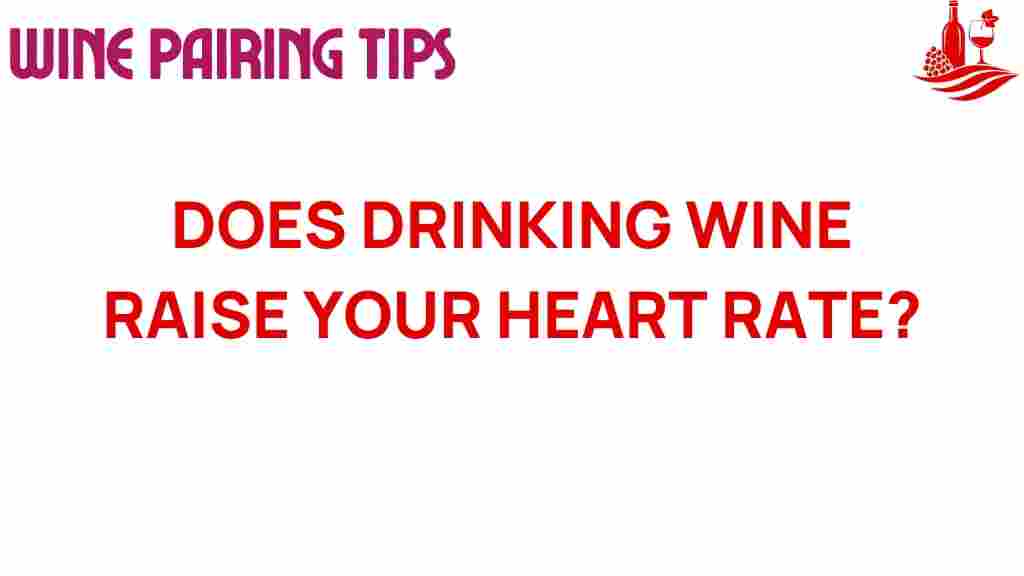Uncorking the Truth: Does Drinking Wine Raise Your Heart Rate?
Wine has been a beloved beverage for centuries, often associated with celebrations, relaxation, and even health benefits. However, as we sip our favorite varietals, a question looms: does drinking wine raise your heart rate? This inquiry is significant, particularly for those conscious of their heart health and the effects of alcohol on the body. In this article, we’ll explore the relationship between wine, heart rate, and overall health, drawing on the latest research and expert opinions.
The Basics of Wine and Heart Rate
To understand the connection between wine and heart rate, it’s essential to grasp how alcohol affects the cardiovascular system. When consumed, alcohol can influence blood pressure and heart rate in various ways:
- Short-term effects: Drinking wine can lead to an initial increase in heart rate due to the body’s response to alcohol.
- Long-term effects: Moderate consumption of wine may have protective benefits for heart health, possibly lowering the risk of heart disease.
But how much is considered “moderate”? The definition of moderation can vary, but many health experts suggest that up to one glass of wine per day for women and up to two glasses for men can be beneficial.
Research on Wine, Heart Rate, and Health
Numerous studies have examined the effects of wine on cardiovascular health. Here are some key findings:
- Heart Rate Variability: A study published in the Journal of the American College of Cardiology found that moderate wine consumption is associated with improved heart rate variability, a marker of cardiovascular health.
- Antioxidants in Wine: Red wine, in particular, contains antioxidants such as resveratrol, which have been linked to heart health benefits.
- Alcohol and Cardiovascular Risk: Research suggests that moderate alcohol consumption may reduce the risk of coronary artery disease.
While these findings are promising, it’s crucial to remember that the effects of alcohol can vary greatly among individuals, depending on factors such as genetics, lifestyle, and existing health conditions.
How Drinking Wine Affects Heart Rate
When you drink wine, several physiological processes come into play that can affect your heart rate:
- Vasodilation: Alcohol causes blood vessels to widen, which can lead to a temporary increase in heart rate.
- Stimulation of the Nervous System: Alcohol can stimulate the autonomic nervous system, increasing heart rate during and shortly after drinking.
- Dehydration: Wine is a diuretic, which can lead to dehydration and subsequently affect heart rate.
Understanding these mechanisms can help individuals make informed decisions about their drinking habits and cardiovascular health.
Moderation is Key
While moderate consumption of wine may have some health benefits, it’s essential to practice moderation. Here are some guidelines to keep in mind:
- Know your limits: Stick to the recommended guidelines of one glass per day for women and two for men.
- Choose wisely: Opt for red wine, which is often touted for its higher antioxidant content.
- Stay hydrated: Drink water alongside wine to minimize dehydration effects.
By following these tips, you can enjoy wine while maintaining a healthy heart rate and overall cardiovascular health.
Potential Risks of Drinking Wine
While wine has its benefits, it’s vital to consider the potential risks associated with alcohol consumption:
- Increased Heart Rate: For some individuals, especially those with certain medical conditions, alcohol can lead to a dangerously high heart rate.
- Addiction and Dependence: Regular drinking can lead to alcohol dependence, which has numerous health risks.
- Interactions with Medications: Alcohol can interact with various medications, affecting heart rate and overall health.
Always consult with a healthcare professional if you have concerns about how wine may affect your heart rate or overall health.
Step-by-Step Guide to Enjoying Wine Responsibly
To enjoy wine while being mindful of your heart rate and health, follow this simple guide:
- Choose Quality Over Quantity: Select a good bottle of wine rather than opting for cheaper options that may contain additives.
- Practice Mindful Drinking: Pay attention to your body’s responses as you drink. If you notice an increased heart rate, consider reducing your intake.
- Pair with Food: Enjoy wine with meals to slow the absorption of alcohol and minimize its impact on heart rate.
- Limit Other Stimulants: Avoid pairing wine with caffeine or other stimulants, which can exacerbate increases in heart rate.
- Monitor Your Health: Regularly check your heart rate and consult with a healthcare provider regarding your alcohol consumption.
Troubleshooting Tips
If you find that drinking wine seems to increase your heart rate consistently, consider these troubleshooting tips:
- Evaluate Your Drinking Habits: Keep a journal to track when and how much you drink, along with any changes in your heart rate.
- Consult a Professional: If you’re concerned about your heart rate, speak with a healthcare provider for personalized advice.
- Explore Alternatives: Consider non-alcoholic wines or other beverages to enjoy social settings without the effects of alcohol on your heart rate.
Conclusion
In conclusion, the relationship between wine, heart rate, and health is complex and influenced by numerous factors. While moderate consumption of wine may have cardiovascular benefits, it is essential to be mindful of personal limits and the potential risks associated with alcohol consumption. Ultimately, understanding your body’s responses and maintaining a balanced approach can help ensure that your enjoyment of wine aligns with your overall health goals.
For more information on healthy drinking habits, you can visit the CDC’s guidelines on alcohol consumption. Remember, knowledge is key to making informed decisions about your health!
This article is in the category Tips and created by Wine Pairing Tips Team
